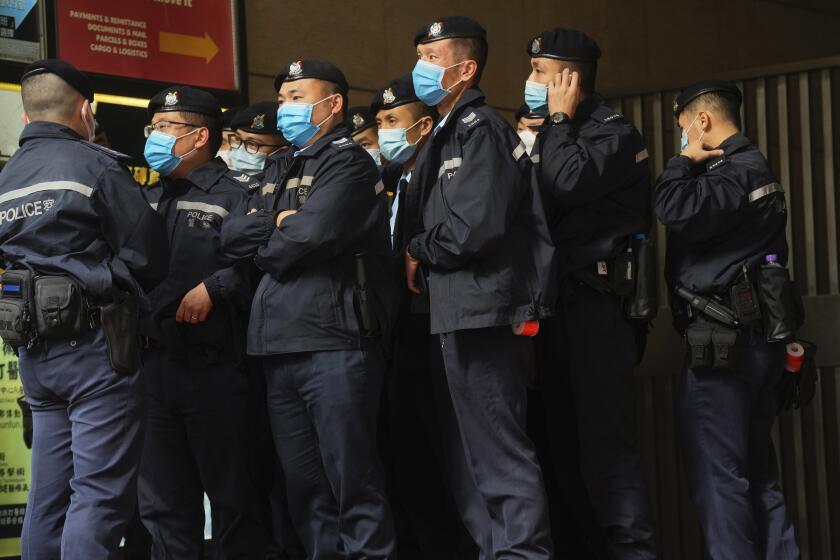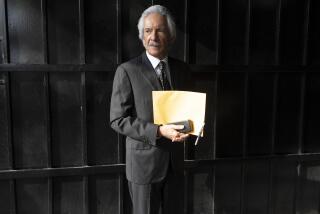Hong Kong court sentences editor to 21 months in jail in case seen as barometer of press freedom

A Hong Kong court sentenced a former editor of a shuttered news publication to 21 months in prison on Thursday in a sedition case that is widely seen as an indicator of media freedom in the city, once hailed as a beacon of press freedom in Asia. A second editor was freed after his sentence was reduced because of ill health and time already served in custody.
Former Stand News editor-in-chief Chung Pui-kuen and former acting editor-in-chief Patrick Lam are the first journalists convicted under a colonial-era sedition law since the former British colony returned to Chinese rule in 1997. Chung was sentenced to 21 months but is expected to stay in prison for about 10 months given his pre-conviction detention. Lam was also sentenced but allowed to go free.
The online news outlet was one of the last in Hong Kong that dared to criticize authorities as Beijing imposed a crackdown on dissidents following massive pro-democracy protests in 2019.
Its closure in December 2021 came months after the demise of pro-democracy newspaper Apple Daily, whose jailed founder Jimmy Lai is battling collusion charges under a tough national security law imposed by Beijing in 2020.
Last month, the court found Chung and Lam guilty of conspiracy to publish and reproduce seditious materials, along with Best Pencil (Hong Kong) Ltd., Stand News’ holding company. They faced up to two years in prison and a fine of 5,000 Hong Kong dollars (about $640). The company was fined that amount.
The convictions of two Hong Kong journalists who led a now-shuttered online news outlet have deepened concerns over the city’s press freedom.
Judge Kwok Wai-kin began Thursday’s sentencing hearing two hours after the scheduled time. The journalists’ lawyer, Audrey Eu, requested a sentence mitigation, saying Lam had been diagnosed with a rare disease and she was concerned that he could not be treated by the hospital handling his case if he were sent to jail again.
She argued that they should be sentenced to up to time served, saying their case was different because they were journalists whose duties were to report different people’s views. The defendants were detained for nearly a year after their arrests before being released on bail in late 2022.
In his sentencing, Kwok dismissed the defense’s argument that the journalists had unintentionally fallen afoul of the law, and accused them of siding with the protesters. Since Stand News had a mass following, the seditious articles caused serious harm to the Beijing and Hong Kong governments, he said.
“The three defendants were not engaged in genuine media work but were instead participating in the so-called resistance of that time,” he said.
Kwok wrote in his verdict in August that Stand News had become a tool for smearing the Beijing and Hong Kong governments during the 2019 protests. He ruled that 11 articles published under the defendants’ leadership carried seditious intent, including commentaries written by activist Nathan Law and veteran journalists Allan Au and Chan Pui-man. Chan, who is also Chung’s wife, earlier pleaded guilty in the Apple Daily case and is in custody awaiting her sentence.
An online Hong Kong news site cites deteriorating press freedoms as the reason it will cease operations Tuesday.
Kwok said Lam and Chung were aware of and agreed with the seditious intent, and made Stand News available as a platform to incite hatred against the Beijing and Hong Kong governments and the judiciary.
Eu told the court that the articles in question represented only a small portion of what Stand News had published. The defendants also stressed their journalistic mission in their mitigation letters.
On Thursday morning, dozens of people waited in line to secure a seat in the courtroom.
Former Stand News reader Andrew Wong said he wanted to attend the hearing to show his support, though he felt it was like “attending a funeral.” Wong, who works in a non-governmental organization, said he expected the convictions last month, but still felt “a sense that we’ve passed a point of no return” when he heard the verdict.
“Everything we had in the past is gone,” he said.
Their trial, which began in October 2022, lasted some 50 days. The verdict was postponed several times for reasons including a wait for an appeal outcome in another landmark sedition case.
Rights groups swiftly expressed concern about media freedom in the city after Thursday’s sentencing.
The Hong Kong Journalists Assn. said the sentences reflect the ongoing decline of press freedom and the real dangers faced by journalists.
Hong Kong unveiled a proposed law that threatens life imprisonment for residents who “endanger national security” on Friday, deepening worries about erosion of freedoms.
“There is nothing wrong with safeguarding national security, but allowing journalists to speak out and enabling society to speak freely is necessary to maintain Hong Kong’s prosperity and stability,” it said in a statement.
Cédric Alviani, Asia-Pacific director for media watchdog Reporters Without Borders, said Chung and Lam were serving the public’s interest and should never have been detained. He urged the international community to increase pressure on China to secure the release of Chung and other journalists detained in the city.
Amnesty International’s China director, Sarah Brooks, said the sentences given to the defendants “simply for doing their job makes this another bleak day for press freedom in Hong Kong.”
Hong Kong was ranked 135 out of 180 territories in Reporters Without Borders’ latest World Press Freedom Index, down from 80 in 2021 and 18 in 2002.
Self-censorship has also become more common during the political crackdown on dissent following the 2019 protests, with increased reports of harassment against journalists in recent months. In March, the city government enacted another new security law that raised concerns about a further curtailment of press freedom.
Hong Kong officials insist the two security laws are necessary to maintain stability and that there are no restrictions on media freedom when journalists report the facts.
Leung writes for the Associated Press.
More to Read
Sign up for Essential California
The most important California stories and recommendations in your inbox every morning.
You may occasionally receive promotional content from the Los Angeles Times.













